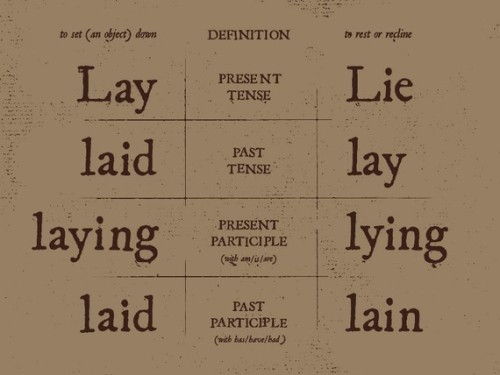Stand With Ukraine 🇺🇦
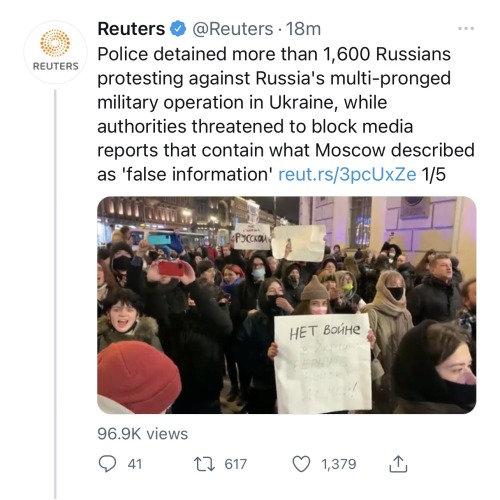

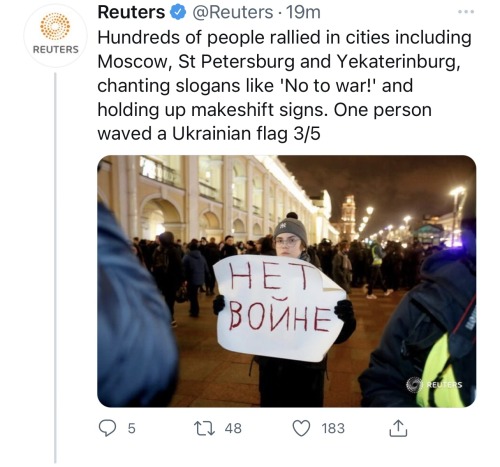
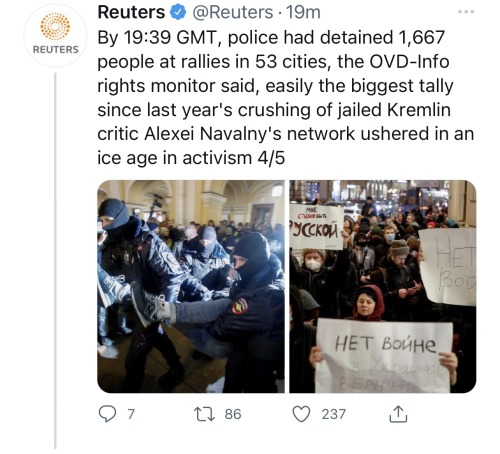
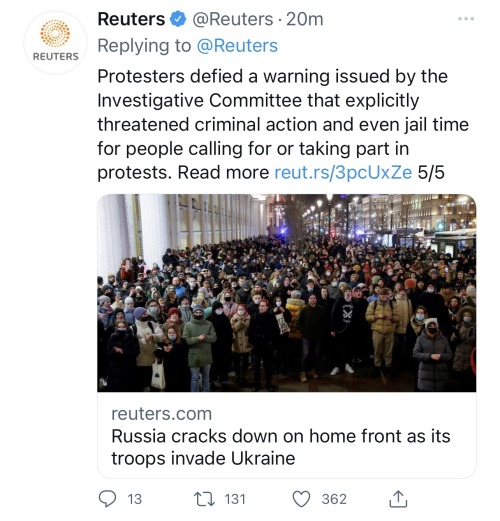
There are Russian citizens who understand that Putin’s invasion of Ukraine is wrong, and they are showing up & showing out.




👉🏿 https://www.reuters.com/world/europe/russia-cracks-down-home-front-its-troops-invade-ukraine-2022-02-24/
For all the tankies and misguided “leftists” who somehow think that backing Putin is the way to show how “pure” their “communism” is—THIS is how you do it. THIS is how you rise up. These Russian protesters aren’t talking shit, while hiding behind a keyboard, in the safety of a country that’s safely not being invaded. These Russian citizens are openly protesting Putin’s war and their own government. They are putting it all on the line and literally risking everything to protest Putin’s imperialism. They are showing solidarity with the people of Ukraine.
Bravo. 👏🏿👏🏿👏🏿 Bravo. 👏🏿👏🏿👏🏿
Stand With Ukraine 🇺🇦
More Posts from Sinedra and Others
I know, once again art instead of advice, but @janeopries ugh just look at this. Look at them!
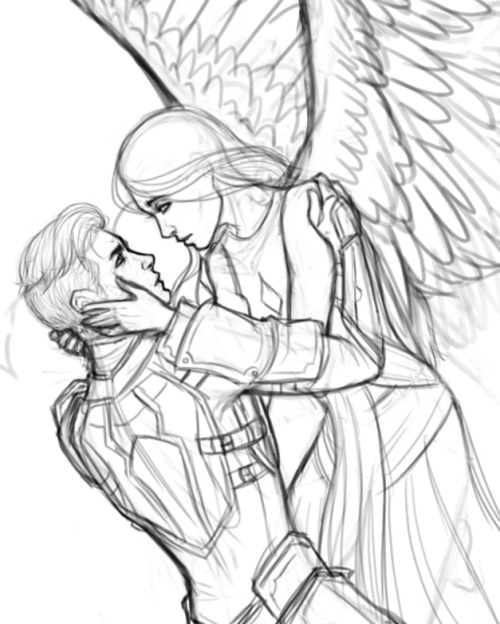
Close up WIP of a commission for @sinedra! ♥
never forget your roots
fanfiction.net before they removed the NC-17 stories
going to fanfiction.net at all
going to adultfanfiction.net in the fallout of the great “purge”
figuring out that ain’t nobody actually monitoring NC-17 stories there anyway so just rate it “M”
“please R&R! concrit appreciated!”
warning: lemon
though it may be more on the limey side of lemon
“summary sux just read it”
replying to reviews in the author’s notes
author’s notes in which the characters talk to each other and the author
How to Detect Text Written by AI
Once my mutuals reminded me not to let fear take over and to get out of my own head, I did. And when I did, I realized something—those who are feeding authors’ fics into these notoriously unreliable AI detectors are actually helping these companies by giving them more data. And most of these companies? They also have their own AI content generation tools, which means they are using the samples of the writing of from those authors’ to improve their own AI generation tools.
So now, I’m not just scared—I’m scared and mad.
Instead of making unproductive call-out posts that don’t actually help the community recognize AI-generated text, let’s do something useful. Let’s talk about ways you can be empowered as a reader to spot AI-generated content.
There is no fool proof method to figure out for sure if a text is AI generated, unless you are literally physically sitting with the writer watching them write like they are a zoo animal.
AI detectors are unreliable and inconsistent. Plus, with how quickly AI-generated content is evolving, these tools are constantly lagging behind, making them outdated and even less effective over time.
Thus far, the best AI detection is YOU. It isn’t easy at first, but the research shows that you can learn how to do this.
One article from the MIT Technology Review (2019) states:
Another study found that untrained humans were able to correctly spot text generated by GPT-3 only at a level consistent with random chance. The good news is that people can be trained to be better at spotting AI-generated text, Ippolito says. She built a game to test how many sentences a computer can generate before a player catches on that it’s not human, and found that people got gradually better over time. “If you look at lots of generative texts and you try to figure out what doesn’t make sense about it, you can get better at this task,” she says. One way is to pick up on implausible statements, like the AI saying it takes 60 minutes to make a cup of coffee.
Fun fact: This article has the journalist submitting her own work to various AI detectors, one of them being Originality.AI, which indicated her writing had a 50-50 split on being AI and human.
One of the problems with these large language models (LLMs), as this article from Capitol Technology University points out, is that it has made AI generated text more complex, making it harder to tell it apart from human writing. But, they share some signs you can look for, as described from their article below:
Inconsistencies and repetition: Occasionally, AI produces nonsensical or odd sentences which can be a clear indicator of AI-generated text. Abrupt shifts in tone, style, or topic can point to AI that is struggling to maintain coherent ideas. Whereas humans often vary structure to create a better flow, repeated phrases or sentence structures can point to AI relying more on memorized patterns. Occasionally, AI produces nonsensical or odd sentences which can be a clear indicator of AI-generated text.
Context and content: If the text seems to be unable to grasp the larger context of the writing, is missing the point entirely, or references specific details without appropriate context, it could be AI.
Does that mean all inconsistencies, excessive repetition, or overly descriptive writing automatically indicate AI-generated text? No, absolutely not. Writing styles vary, and many human writers naturally have quirks like these.
This article from Forbes (2024) identified 5 ways to help identify AI generated content, but I feel these 3 specific ones best apply to fiction and fanfics:
Language Patterns: AI generated text tends to lack emotional subtlety, be overly formal, or use complex words, leading to the sentences sounding stiff and not flowing well. Alternatively, the over use of cliches. Consistency Issues: AI generated text tends to struggle with narrative details, leading to abrupt changes in the story. For example an abrupt change in the description of a setting without explanation. Unusual Language Errors: Sometimes AI generated text uses odd and unusual phrases that feel out of place.
Again, does this automatically mean that writing lacking emotional subtlety or being overly formal is AI-generated? No, not at all. Writing styles vary, and some authors naturally have a more formal tone or a direct approach to storytelling.
If I find a story that I think is AI-generated, what should I do?
1. Pause and Assess – Don't Jump to Conclusions
AI-generated text can sometimes be hard to distinguish from human writing, and many of the so-called “signs” of AI can also be just someone’s writing style or someone being new to writing. Before assuming a fic is AI-generated, take a step back and look at it critically.
Does it actually feel off in a way that suggests AI (such as major consistency errors, repetitive phrases, or nonsensical sentences)?
Or does it just have a different writing style than you’re used to?
2. Don’t Rely on AI Detectors
As shown in multiple studies and real-world examples, AI detectors are not reliable. They are inconsistent, often outdated, and can flag even completely human-written work as AI. Using them as definitive proof, even with the above information does more harm than good.
Also, some of these AI detectors programs also have AI generation programs. You are literally providing more data to these programs to help improve generate AI text.
If an AI detection program does not appear to have a a sister program that generate AI content, ask yourself:
Could this company be mangaged by a parent company that DOES have an AI generated program?
Have you read the terms and conditions to agree to use this AI detection program? If not, have you considered where does the data you have it analyze go? Is it stored and sold to 3rd parties to be used to improve AI generated content programs?
3. Consider Reaching Out to the Author First
If you still have doubts, and you feel it’s appropriate, you could politely reach out to the author. Instead of accusing them, ask about their writing process or how they developed the story. Most human writers love to talk about their inspiration, research, and creative choices.
4. Avoid Public Call-Outs
Unless you have strong, irrefutable proof (which is very hard to get), publicly accusing someone of using AI can do serious harm—both to the writer and to the community as a whole. False accusations drive real writers away from sharing their work.
5. If You’re Concerned About AI in Creative Spaces, Advocate for Constructive Discussions
Instead of call-outs and AI detectors, push for conversations on how to navigate AI in fandoms and creative writing spaces in a way that doesn’t rely on fear or false accusations. Encourage transparency, but also respect that writers shouldn’t have to prove their humanity just to share their work.
Thank you and I will now go back to playing in my little section of the dragon age sandbox where I make Solas kiss Lavellan.

In light of my recent writer positivity, have this post from a year ago that I almost forgot about.
Never let anyone tell you that you can’t write. You are NEVER: too young, too old, too mature, too naive, too uneducated, too intelligent, too unoriginal, or too boring.
ANYONE can be a writer and EVERYONE is just as qualified as published authors.
You don’t have to have an english/literature/creative writing degree to magically make you worthy enough to try. Many published authors just picked it up after their day jobs, did it for a hobby. If they can do it, you can as well.
No one can stop you unless you let them, yours is the only opinion that should matter. So write your fanfiction, your novella, short story, screen play, or novel. Don’t give a damn about what the naysayers believe. Be fucking proud of every word you put down on the page (yes, even horrible rough drafts) because you’re amazing.
You ARE a writer. Be proud of that.
I'm not even slightly sorry.

You want weapons? We're in a library. Books are the best weapon in the world. This room's the greatest arsenal we could have. Arm yourself!
David Tennant as the 10th Doctor. - Doctor Who season 2: "Tooth and Claw"
I hate how there’s a fan culture where fan writing is seen as less valuable than fan art. Hold on with me here, I’ve got some coherent thoughts on this.
1. Creators of the original work one might be a fan of have explicitly said that they don’t look at or respond to anything written for fear of being sued. Like, shit. I don’t want to sue anyone. I want creators to tell me, “Oh, wow. You took my thing and made it amazing!” Fan art gets reblogged and commented on by creators because there’s no fear of law. Fan art gets more validation and praise than fan writing.
2. Popularity of fan writing increases when there is fan art dedicated to the piece. Fan art is popular no matter if fan writing is made from it.
3. In general, fan art is reblogged and liked more often than fan writing. Art is pretty and might occupy an “aesthetic” while writing is considered to clog up a dash with too many words.
4. Fan art is easy to engage with no matter the demographics of your audience. Writing will–at the very least–limit the age demographic. If you write for an older audience, younger folk might not be into it and vise versa.
5. And unless you’re super into supporting fan writing, you’ll probably not say anything about it. Fan art gets the bare minimum of “gorgeous.”

idk if anyone will find this useful, but this is how i go about planning my stories. i mostly write fantasy, so that’s what this is most applicable to. but it could work with other genres too.
so there’s three major components to a story: the characters, the plot, and the world. creating them individually is the easy part, but they all connect and affect each other in different ways. (like you can’t have a character who loves peaches and eats them every day if they live a peasant in a region that doesn’t grow peaches, for example.)
so i created a cheat sheet to help connect all three components together.
1) the world creates the characters.
this is related to the peach example above. the characters should be a direct result of the environment they grew up in and the environment they currently live in.
2) the characters are limited by the world.
also related to the peaches. characters can’t do anything outside of what the rules of their surroundings and universe allow, such as eating peaches when they’re not available. this also applies for magic users. they can’t have unlimited magic, so keep in mind what you want out of both the characters and the world when creating magic systems.
3) the characters carry the plot.
we’ve all heard it before: “bad characters can’t carry a good plot. good characters can carry a bad plot.” but we all like a good plot anyway. try to make sure you’re not giving your characters too heavy or too light of a plot to carry.
4) the plot pushes the characters.
if nothing in the plot happens, your characters will remain static forever. if you struggle with plots, try starting with what character development you want to happen, then go from there.
5) the plot depends on the world.
you can’t overthrow the evil government if there isn’t one. think of what your world needs most and what your plot is centered around, and fit those two together.
6) the world is changed by the plot.
even if your plot is centered around something most of your world would call “insignificant”, the world will still experience some change from the plot. either the evil government will be gone, or maybe that one teacher is now way more careful about keeping an eye on the test key. either way, the world will be different from now on.
final note: usually people will be able to write one or two of the components with ease, but don’t know where to go from there. i personally can’t write plots, but thinking this way has really helped me actually make a story out of the world and characters because i looked at what i needed from what i had. i really hope this can help you too! happy writing!
tl;dr this is a cheat sheet to help anyone who struggles with writing one or two of what i consider the three major components to a story.

-
 asharkapologist liked this · 2 months ago
asharkapologist liked this · 2 months ago -
 abookofobscuresorrows liked this · 3 months ago
abookofobscuresorrows liked this · 3 months ago -
 i-would-like-to-leave liked this · 3 months ago
i-would-like-to-leave liked this · 3 months ago -
 famousinuniverse liked this · 3 months ago
famousinuniverse liked this · 3 months ago -
 thefoyer liked this · 4 months ago
thefoyer liked this · 4 months ago -
 paramsndjd liked this · 5 months ago
paramsndjd liked this · 5 months ago -
 casejewy liked this · 5 months ago
casejewy liked this · 5 months ago -
 s0rr03 liked this · 5 months ago
s0rr03 liked this · 5 months ago -
 izalupaeshkere liked this · 5 months ago
izalupaeshkere liked this · 5 months ago -
 okroshkarin liked this · 5 months ago
okroshkarin liked this · 5 months ago -
 xionisdumb reblogged this · 6 months ago
xionisdumb reblogged this · 6 months ago -
 joiscrowe liked this · 7 months ago
joiscrowe liked this · 7 months ago -
 faliti liked this · 7 months ago
faliti liked this · 7 months ago -
 mingareco liked this · 8 months ago
mingareco liked this · 8 months ago -
 shadowdelusionmaster liked this · 9 months ago
shadowdelusionmaster liked this · 9 months ago -
 victoriasoroka liked this · 9 months ago
victoriasoroka liked this · 9 months ago -
 i-lived-bitxh reblogged this · 10 months ago
i-lived-bitxh reblogged this · 10 months ago -
 i-lived-bitxh liked this · 10 months ago
i-lived-bitxh liked this · 10 months ago -
 vinceer liked this · 11 months ago
vinceer liked this · 11 months ago -
 1blankmask1 liked this · 11 months ago
1blankmask1 liked this · 11 months ago -
 fransenter liked this · 11 months ago
fransenter liked this · 11 months ago -
 darkussuar reblogged this · 11 months ago
darkussuar reblogged this · 11 months ago -
 ssuujin liked this · 11 months ago
ssuujin liked this · 11 months ago -
 alexroyz liked this · 1 year ago
alexroyz liked this · 1 year ago -
 smartpeoplearehot liked this · 1 year ago
smartpeoplearehot liked this · 1 year ago -
 mishechak liked this · 1 year ago
mishechak liked this · 1 year ago -
 maryusya liked this · 1 year ago
maryusya liked this · 1 year ago -
 thelunarguide liked this · 1 year ago
thelunarguide liked this · 1 year ago -
 majesticfloof liked this · 1 year ago
majesticfloof liked this · 1 year ago -
 icamestraightfromrome liked this · 1 year ago
icamestraightfromrome liked this · 1 year ago -
 chaossnail liked this · 1 year ago
chaossnail liked this · 1 year ago -
 fluffyyymocha reblogged this · 1 year ago
fluffyyymocha reblogged this · 1 year ago -
 fluffyyymocha liked this · 1 year ago
fluffyyymocha liked this · 1 year ago -
 thenuttykraken liked this · 1 year ago
thenuttykraken liked this · 1 year ago -
 cut-aare liked this · 1 year ago
cut-aare liked this · 1 year ago -
 moonlight-shipper-haven liked this · 1 year ago
moonlight-shipper-haven liked this · 1 year ago -
 aceasherminty liked this · 1 year ago
aceasherminty liked this · 1 year ago -
 searchingforthelamps liked this · 1 year ago
searchingforthelamps liked this · 1 year ago -
 theguiltynova liked this · 1 year ago
theguiltynova liked this · 1 year ago -
 grungehoneybee liked this · 1 year ago
grungehoneybee liked this · 1 year ago -
 777greywolf liked this · 1 year ago
777greywolf liked this · 1 year ago -
 miki-13 reblogged this · 1 year ago
miki-13 reblogged this · 1 year ago -
 miki-13 liked this · 1 year ago
miki-13 liked this · 1 year ago -
 mzrse-spiritguardian liked this · 1 year ago
mzrse-spiritguardian liked this · 1 year ago -
 imjustheretofangirl003 liked this · 1 year ago
imjustheretofangirl003 liked this · 1 year ago -
 katy91 reblogged this · 1 year ago
katy91 reblogged this · 1 year ago -
 fudgememother liked this · 1 year ago
fudgememother liked this · 1 year ago -
 wonderlandifulcat reblogged this · 1 year ago
wonderlandifulcat reblogged this · 1 year ago -
 wonderlandifulcat liked this · 1 year ago
wonderlandifulcat liked this · 1 year ago

A simple blog dealing with writing, books, and authors. Writing blog is Sinedras-Snippets. Icon and header by miel1411
164 posts
